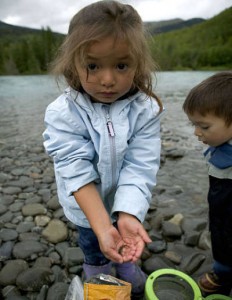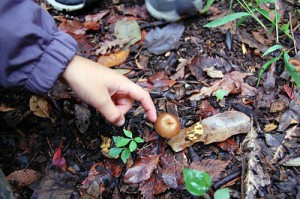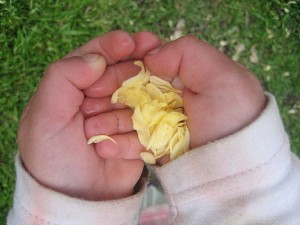 As I watched the solar transit of Venus this week, it was a vivid reminder of one of the most important Parenting for Peace qualities: wonder.
As I watched the solar transit of Venus this week, it was a vivid reminder of one of the most important Parenting for Peace qualities: wonder.
A fundamental need of the young child until around seven is an atmosphere in harmony with his natural impulse to celebrate beauty and feel reverence and awe about almost everything. But what does our culture do in this techno-materialist age? We foist upon even the youngest child a flat world of facts and commentary. At a time when the child most needs wonder and reverence, we explain away all sense of the miraculous with our cool adult intellect, with the good intention of helping prepare them for the real world. (“Daddy, look at that bright star!” “Oh yes, Esmerelda — do you know that a star is just a very dense concentration of gases — just air! — that burns very, very hot…thousands of light-years away…”) Mystery eradicated, poof!
Sheltering your child’s natural sense of wonder — and indeed, cultivating your own if it has atrophied over the years — is a gift of lasting wellbeing for you both. An inoculation against ennui. That sense of “Wow, water out of the tap! or “Wow, text sent over phone lines through squeaky little noises!” is a route to vast inner horizons. When we lose that, we need ever more stimulation — more shopping, more drama, more drugs and alcohol, more thrillers (which feeds the collective propensity toward societal violence), more sexual excess, and so on — to fill the void of disenchantment.
 One helpful way to cultivate wonder is to imagine looking out at the world through your child’s eyes, which brings the uplifting quality of his or her natural enchantment to the fore. The more we can live, as Joseph Chilton Pearce puts it, “in constant astonishment,” the more we can attune to the aspect of our children that seeks reverence, awe and beauty. Having a child by your side — looking out through her eyes of wonder — gives you permission to be especially exuberant in expressing delight in a world in which everything can be magically alive. “Hello, leaves…hello, pebbles…hello, wind!” A central tenet of esoteric psychology is that once you acknowledge the life in everything, it awakens life energies in you. Perhaps this is one reason behind the success of mindfulness for treating depression.
One helpful way to cultivate wonder is to imagine looking out at the world through your child’s eyes, which brings the uplifting quality of his or her natural enchantment to the fore. The more we can live, as Joseph Chilton Pearce puts it, “in constant astonishment,” the more we can attune to the aspect of our children that seeks reverence, awe and beauty. Having a child by your side — looking out through her eyes of wonder — gives you permission to be especially exuberant in expressing delight in a world in which everything can be magically alive. “Hello, leaves…hello, pebbles…hello, wind!” A central tenet of esoteric psychology is that once you acknowledge the life in everything, it awakens life energies in you. Perhaps this is one reason behind the success of mindfulness for treating depression.
Avoiding TITD (Talk It To Death) Syndrome
One of the simplest ways to increase a sense of reverence and awe is to put yourself on a zip-the-lip regime. Say less, let it mean more. There is an epidemic raging, which I call TITD (Talk It To Death) syndrome. One only has to spend a little time with any American family to see TITD in action: “Why is there a rainbow on the wall?” “Well, Samantha, the sunlight is being split into seven different wavelengths by the refractive index of the crystal on my watch sitting there on the counter.” Wonder and awe quotient abysmally low.
 The Hurried Child author David Elkind offers an illustration of how young children’s questions are usually focused on the purpose (why) of things rather than an explanation (how): His preschool aged son asked him, “Daddy, why does the sun shine?” At first tempted to give him a scientific answer about the relationship of heat and light, he remembered this principle behind the young child’s questions. He simply answered, “To keep us warm, and to make the grass and the flowers grow.” In this spirit, a more nurturing response to Samantha’s question about the rainbow might have been, “To make our morning more beautiful with the special qualities that sunlight can have.”
The Hurried Child author David Elkind offers an illustration of how young children’s questions are usually focused on the purpose (why) of things rather than an explanation (how): His preschool aged son asked him, “Daddy, why does the sun shine?” At first tempted to give him a scientific answer about the relationship of heat and light, he remembered this principle behind the young child’s questions. He simply answered, “To keep us warm, and to make the grass and the flowers grow.” In this spirit, a more nurturing response to Samantha’s question about the rainbow might have been, “To make our morning more beautiful with the special qualities that sunlight can have.”
Your young child (especially at four and five) will generate a seemingly unending stream of questions — one of the ways she is working on developing intellectual and social initiative. There is a delicate balance for the attuned parent to strike — between falling into the TITD trap on the one hand, or being dismissive or unresponsive to the child’s earnest inquiries on the other. If we brush off, demean or ignore a child’s questions he may associate curiosity with a feeling of guilt or shame, which is a catastrophe for the future peacemaker, in whom curiosity must remain a crackling blaze.
To support and foster his robust sense of initiative and curiosity, strive to feel your way into the lifeworld of the young child, which wants to know in a way that preserves wonder and reverence for a still-magical world. There is time aplenty for the bottom-line, scientific knowledge of “reality.”
Two Wonder-Full Responses to a Child’s Endless Stream of Questions
 Here are two handy answers to have at the ready, which work in virtually any situation in which you’re caught off-guard by your child’s question (like when our son asked, “Do people grow down before they die?”). The first is, “I wonder…” This leaves the child’s own imagination open to all the possibilities that will come her way, and allows her to remain in the dream-space that is a child’s right. I fear, however, that in our hyperintellectual culture many parents would feel remiss in giving a response like this, afraid of failing the child by not providing an “answer.” Yes, “I wonder” can be considered an advanced maneuver that you can work toward saying with confidence and tranquility.
Here are two handy answers to have at the ready, which work in virtually any situation in which you’re caught off-guard by your child’s question (like when our son asked, “Do people grow down before they die?”). The first is, “I wonder…” This leaves the child’s own imagination open to all the possibilities that will come her way, and allows her to remain in the dream-space that is a child’s right. I fear, however, that in our hyperintellectual culture many parents would feel remiss in giving a response like this, afraid of failing the child by not providing an “answer.” Yes, “I wonder” can be considered an advanced maneuver that you can work toward saying with confidence and tranquility.
The second is Elkind’s suggestion to ask the question back to the child. “Well, why do you think a rainbow has appeared in our kitchen?” This will often elicit a stream of enchanting insights into your child’s imaginative capacities — all of which should be met with the utmost interest and respect for her opinions on the matter, never “corrected.” Remember, there will be time aplenty for “reality.”
Bonus Tip From My Venus Adventure
 I realized later that with those oh-so-stylish eclipse glasses on I couldn’t see anything going on around me, including my friends taking photos of me enraptured by the heavenly bodies above. I could see only what I was focused on: the glowing sun with little Venus snaking her way across. Great analogy for filtering out whatever is extraneous, distracting or unhelpful to us in focusing on any central objective, including parenting on the leading edge. Imagine having those eclipse glasses on to filter out unsupportive family, skeptical friends, judgmental looks in public, and even your own doubts or hesitations as you parent on the path less traveled.
I realized later that with those oh-so-stylish eclipse glasses on I couldn’t see anything going on around me, including my friends taking photos of me enraptured by the heavenly bodies above. I could see only what I was focused on: the glowing sun with little Venus snaking her way across. Great analogy for filtering out whatever is extraneous, distracting or unhelpful to us in focusing on any central objective, including parenting on the leading edge. Imagine having those eclipse glasses on to filter out unsupportive family, skeptical friends, judgmental looks in public, and even your own doubts or hesitations as you parent on the path less traveled.
See instead the shining vision of your child unfolding qualities essential in an innovative peacemaker poised for success in a changing world — curiosity, playfulness, willingness to experiment, flexibility, humor, receptiveness to new ideas, eagerness to learn. These lifelong qualities (plus at least five more) are nurtured by wonder now.

*******
By Marcy Axness, PhD, author of Parenting for Peace: Raising the Next Generation of Peacemakers
Images (in order)
Sarah Ripard, used with permission
USFWS Pacific under its Creative Commons license
eren {sea+prairie} under its Creative Commons license
Ernst Vikne under its Creative Commons license
Elaine with Grey Cats under its Creative Commons license
Jimee, Jackie, Tom & Asha under its Creative Commons license
Tags: addiction, cynicsim, early education, parenting, reverence, stimulation, Venus transit, wonder



The child is made of one hundred.
The child has a hundred languages
a hundred hands
a hundred thoughts
a hundred ways of thinking
of playing, of speaking.
A hundred, always a hundred
ways of listening
of marveling
of loving
a hundred joys for singing
and understanding
a hundred worlds to discover
a hundred worlds to invent
a hundred worlds to dream.
The child has a hundred languages
(and a hundred hundred hundred more)
but they steal ninety-nine
the school and the culture
separate the head from the body.
They tell the child to think
without hands
to do without head
to listen and not speak
to understand without joy
to love and marvel
only at Easter and Christmas.
They tell the child
to discover the world already there
and of the hundred
they steal ninety-nine.
They tell the child that
work and play
reality and fantasy
science and imagination
sky and earth
reason and dream
are things
that do not belong together.
And thus they tell the child
that the hundred is not there.
The child says:
No way. The hundred is there!
— Loris Malaguzzi
Thank you, Sandra, for your eloquent comments as well as this oh-so-apropos verse.
Thank you, Marcy. Loving and agreeing with your article at all levels. Made me think of one of my favourite books ever “The Little Prince” (and also of the Reggio approach to education i.e. the hundred languages of children). I do think that as parents, one of our roles is to nurture our children’s innate sense of awe and passion for exploring, discovering and learning about the world. First and most importantly, their world within, which will subsequently lead them to want to explore the world without. Knowledge comes through experience, through living life, through embarking on a journey that will lead us to find the answers to our questions. If we provide our children with all the answers and only serve them ready meals (both litteraly and figuratively speaking), how can we expect them to feel that life is worth living (i.e. because there are endless and countless things to explore, discover, learn, create, etc.)? I think this poem by Loris Malaguzzi (the inspiration behind the “Reggio approach” to education that I was mentioning earlier) serves as a very good illustration of the message in this article, and I would like to share it with you (see following comment).
Teaching a child to hear their hearts answers is essential to getting the right answer. The heart and subconscious knows everything. Asking and seeing a response from universe is the only way humans learn. Memory is repetition and has no use in anything but the military.. Using the minds eye and heart raises IQ test scores by 30 points.
Loving the ride but not school,
RPM